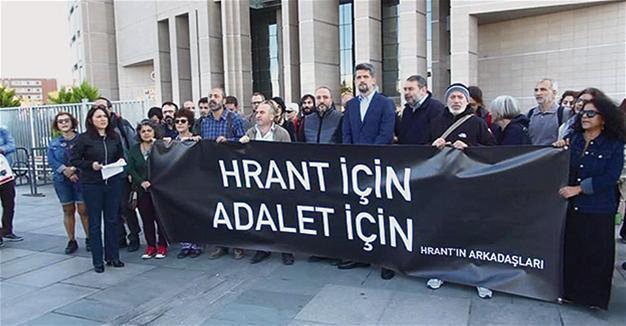Former Istanbul police head: Dink’s murder was a result of coordination failure, my office had no fault
Damla Güler – ISTANBUL
 Officials did not fail to prevent the assassination of Turkish-Armenian journalist Hrant Dink, as the problem actually stemmed from a coordination failure between the police intelligence department and police in Trabzon, where the plot was allegedly organized, former Istanbul police department head Celalettin Cerrah has said.
Officials did not fail to prevent the assassination of Turkish-Armenian journalist Hrant Dink, as the problem actually stemmed from a coordination failure between the police intelligence department and police in Trabzon, where the plot was allegedly organized, former Istanbul police department head Celalettin Cerrah has said. Delivering testimony to the court on Nov. 11 regarding the 2007 murder of Dink, Cerrah, who is a suspect in the decade-long assassination case, denied allegations accusing him of failing to protect the journalist during his term in office, saying he did not have the direct jurisdiction to take security measures for Dink.
Cerrah said the police in the Black Sea region province of Trabzon, in which the plot was allegedly organized and the home of Dink’s assassin, Ogün Samast, should have informed the police intelligence department over the information it received regarding the plot and the assassin and should have, in turn, fostered coordination between Trabzon and Istanbul.
“But both offices did not perform their duties,” Cerrah said, claiming that he did not fail in his duties to protect Dink, demanding his acquittal.
“Even if we ask for a security measure to be implemented, if the governor says no, then it is a no and the protection measure will not be put in place. In addition, information must be received [at the commission] from the national intelligence bureau or police intelligence department concerning the individual to be protected,” Cerrah said.
Cerrah also said the Trabzon Governor’s Office did not have any intelligence on the assassination either, which is why it was not delivered to the governor of Istanbul.
“But the governor was not informed but in fact, he should have been informed. If he was informed, the governor would have delivered this to the corresponding province’s governor, who would be the Istanbul governor of the time, Muammer Güler, and he would have informed me. What would I have done? I would have contacted Hrant Dink and offered him security,” Cerrah added.
Dink, 52, was shot dead with two bullets to the head in broad daylight outside the offices of the Turkish-Armenian weekly newspaper Agos in central Istanbul.
Samast, then a 17-year-old jobless high-school dropout, confessed to the murder and was sentenced to almost 23 years in jail in 2011.
But the case grew into a wider scandal after it emerged that security forces had been aware of a plot to kill Dink but failed to act.
Relatives and followers of the case have long claimed government officials, police, military personnel and members of Turkey’s National Intelligence Agency (MİT) played a role in Dink’s murder by neglecting their duty to protect the journalist.
Turkey’s top court in July 2014 ruled that the investigation into the killing had been flawed, paving the way for the trial of the police officials.
In January 2016, Supreme Court of Appeals ruled to tie the main case into Dink’s murder and prosecution into the public officers’ negligence to prevent the killing of Dink.
















